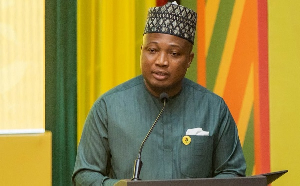By Kofi Ata, Cambridge, UK
Mr Asiedu Nketia, popularly known as General Mosquito and General Secretary of the ruling National Democratic Party (NDC) entered the witness box to give evidence-in-chief in the ongoing Presidential Petition hearing at the Supreme Court (SC) on Thursday May 23, 2013 on behalf of the first and third respondents. This article is an assessment of his performance in the witness box. I will also make brief comparative analysis of his performance against that of the second petitioner and key witness for the petitioners, Dr Bawumia. A word of caution. I did not listen to the totality of his evidence, so this is based on what I listened to.
General Mosquito began his evidence-in-chief led by the lead counsel for the third respondent, Mr Tsatsu Tsikata in what I described as exuberance mood on the first day and appeared to be enjoying himself or perhaps, still in the campaign gear. He also displayed his in-depth knowledge of the rules of the game (the processes and procedures of electoral organisation and management in Ghana). Occasionally, the witness seemed to be mixing his words or using certain words interchangeably (such as, petitioners for respondents and vice versa). Most of the time, he went on to elaborate for far too long than expected and was necessary. The first day ended well for him and in high spirit from his demeanour.
The second day, Tuesday May 28, 2013 did not begin well for the General. Perhaps, the euphoria following his performance on the first day (including a suggestion for the establishment of a university of elections and for him to be appointed its Vice-Chancellor), might have given him and his team a false sense of overconfidence and therefore forgot to do their home work well. Sometimes, he appeared surprised by the questions being put to him and in his efforts to show that he was well-versed in the electoral processes, he ended up either contradicting himself or confusing everybody including his counsel who was leading him in evidence. For example, when asked to explain what he meant by the petitioners coming to court in bad faith, instead of responding that, they had selected pink sheets from only the strongholds of the first respondent, he went on and on and almost forgot to mention the selective nature of the evidence.
I expected counsel for the third respondent to lead his witness in evidence longer than what actually transpired on the second day. I suspected lead counsel realised that his witness could cause self inflicting damage to their cause if he continued with the evidence-in-chief. He therefore decided to curtail the process as a precaution. I believe for the same reason of avoiding any further contradictions, lead counsel did not avail to themselves the right of re-examination. I may be wrong and perhaps, the lead counsel was working according to a predetermined strategy.
Then came what we all expected, facing cross examination by the lead counsel for the petitioners, Mr Addison. Though the presiding Justice had indicated that it was time for lunch break, counsel was eager to fire the first bullet at General Mosquito. The first question was to dismember the witness’s earlier assertion that he had 34 years experience of participating in elections. Counsel asked if he had ever been involved in biometric elections, to which he answered in the negative. Though, it was a powerful way of beginning his cross examination to destroy the evidence of the witness and to discredit him, I am not sure why he insisted on asking this question just before the break, especially, since the witness never claimed his 34 years experience included biometric election/s. Nonetheless, it was an excellent beginning that could have been capitalised upon more effectively had the cross examination continued immediately following that first question.
If one expected General Mosquito to follow the example of his first answer to the first question under cross examination (by yes or no), we were very mistaken. When hearing resumed it became clear that, the Mosquito was not going to lie low for his wings to be clipped. Rather, he was ready for a fight and if possible to bite hard and inflict further damage to both sides. His answers became longer and longer and often failed or deliberately refused to answer the question. Lead counsel for the petitioners sometimes appeared frustrated with the evasive and long answers and had to point out to the witness that he had not answered the question. On some occasions, he managed to squeeze the yes or no answer from the witness.
It was clear that General Mosquito’s back was against the wall but still continued being evasive. It reminded me of our days at boarding school when one woke up in the morning to find a well fed mosquito in your mosquito net. You wondered how that devil got into your net to suck all that blood from you. In your anger, you wanted to kill it with all your strength but also conscious of the fact that if you were not careful, blood could soil your white net or bed sheet. Being cautious meant the mosquito taking advantage of your apparent magnanimity to fly from one end to the other and turn into a game of hide and seek or in your frustration, accidentally open the net and give it the unintended escape route.
On other occasions, Mr Asiedu Nketia claimed or pretended not to have understood or heard the question and requested the question to be repeated or explained, which was within his right. Again, when cornered, he admitted the obvious. For example, when asked if on the evidence of a pink sheet before him, there was over-voting, after dancing around the question with his one dimensional definition of over-voting, he finally did the honourable thing by admitting that, on the face of the pink sheet, there was over-voting.
The long explanations in answering questions also contradicted some of his earlier answers or muddied the waters. Under cross examination, the witness caused some damage to his earlier evidence, though he was consistent in stating in clear and unambiguous terms that there were no over-voting, all voters went through verification and the information on the pink sheets were mistakes or errors. Even when his voice was played in court indicating that he had said in a radio interview that votes without verification, if proven, should be annulled, he refused to admit it and qualified it by saying that, what was played on tape had been and was his position in court.
For reason/s I cannot explain, lead counsel for the petitioners ended his cross examination abruptly or unexpectedly. The respondents claimed that it was because the witness was consistent or the lead counsel was getting nowhere with his cross examination. I beg to differ with them and perhaps lead counsel planned in advance to end the cross examination in that fashion by showing the witness was in denial of his own words and cannot be trusted. Your guess is as good as mine but to me, it was a feeling of mixed blessings.
Comparing the performances of the petitioners’ key witness, Dr Bawumia and that of the first and third respondents, Mr Asiedu Nketia in the witness box is relatively easy due to the similarities of consistencies in style as well as their differences. This comparison is what I refer to as the Bank Governor versus the Rural Bank Clerk.
First, the differences. General Mosquito definitely had an advantage over Dr Bawumia in the areas of the nitty gritty of the election procedures. Though lead counsel for the third respondent designated Dr Bawumia as Dr Pink Sheet during his cross examination for what appeared at that time to be his mastery of pink sheets, Mr Asiedu Nketia was far superior. He would probably be moved from the military to academia with the title of professor of Pink Sheet. However, from the explanations given by Dr Afari-Gyan, Asiedu Nketia will at best, be awarded an Honorary Doctorate in Pink Sheet. Sadly, the Pink Sheet doctoral award to Bawumia will be withdrawn for poor knowledge, misrepresentation and misunderstanding.
Obviously, Dr Bawumia unlike General Mosquito had complete command of the Queen’s language but General did not disgrace himself. Whilst Bawumia denied any knowledge of his party General Secretary’s press conference calling the election for Nana Akufo Addo and asking their supporters to go to church in white, General Mosquito also initially denied knowledge of Dr Afari-Gyan’s “No Verification, No Vote” fatwa. However, under further probing from counsel he admitted that he did not personally hear the declaration but read or heard about it from the media.
The similarities: Both were very consistent with their evasive, sometimes jovial answers and long explanations in responses to questions on matters such as over-voting, data on pink sheets being errors, pink sheets duplications or mislabelling not reflected in analysis, etc. They stuck to their stories even if it contradicted what had been said earlier or contrary to available evidence. Both were sarcastic with some of their answers and both were strong characters with the conviction that they were helping their respective cause/s of achieving nothing but victory.
Whatever damage done by the two key witnesses from the opposite sides to their respective cause/s in the witness box could either be repaired or further destroyed by the evidence of Dr Afari Gyan and at the same time their defences could be strengthened or weakened by the same. In the end, whether it is Dr Bawumia or Mr Asiedu Nketia who caused irreparable damage to their respective cause/s, is difficult to conclude. The answer to this question may be evident as the case enters its final stages through the evidence of the second respondent. The answer is also dependent on what legal interpretation the Justices give to matters such over-voting and whether Dr Afari Gyan’s ‘fatwa’ (No verification, No vote) was constitutional or not, especially, in view of his own explanation that there are two forms of verification (figure print and facial verifications). I had postulated in earlier articles that this fatwa, whether agreed on by the political parties or not, or contained in the Constitutional Instrument, is unconstitutional and I still stand by that.
On the question of whose integrity may be dented, I am of the view that because Dr Bawumia even when pushed to the wall could not admit the obvious (Mr Owusu Afriyie’s press conference declaration), he stands a higher risk of damage to his reputation than Mr Asiedu Nketia. Again, I am still of the view that his image will sore higher if the petition is successful. Only time will tell. I will analyse Dr Afari-Gyan's performance in due course.
Kofi Ata, Cambridge, UK
Opinions of Saturday, 1 June 2013
Columnist: Ata, Kofi














